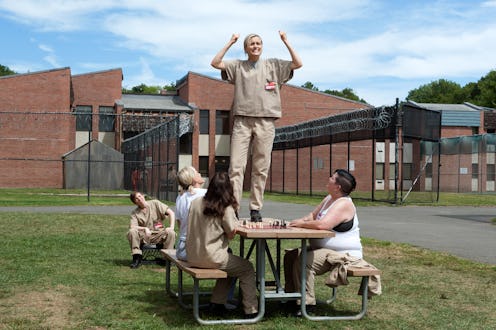Entertainment
'OITNB's For-Profit Prison Makes A Good Point

Orange Is the New Black has always had a social conscience, but OITNB Season 3's for-profit prison storyline went beyond simply humanizing these prisoners and started theorizing about what exactly can be done to help prisoners in the real world. From beginning to end, MCC's takeover was a disaster. Even as prisoners started suffering and suable offenses started piling up, it seemed that the corporation had no interest in improving anything, even to protect themselves. All season long, the message that nothing matters because the CEO will soon be moving on to another job was hammered into every MCC scene, particularly those with Danny Pearson's father, who was playing golf or sniffing whiskey in all of his scenes, as if to underline how far away the corporate world is from the prison. And according to a PRWatch report on GEO, a for-profit prison company, that CEO made over $22 million in just four years.
OITNB is not obligated to tell the whole truth and nothing but the truth, but it is obligated to tell a good story. And, after reading some information on for-profit prisons, it seems the accuracy of the MCC takeover may be exaggerated, but not by much. Out of the 2.3 million people in American prisons, just 16% of federal and 6% of state prisoners are in for-profit prisons. So, still not super common for federal prisons to be privately owned. But, just read this excerpt from PRWatch's GEO piece:
GEO's cost-cutting measures have been criticized for their relationship to inmate-on-inmate and guard-on-inmate (and vice-versa) violence which are many times a result of inadequate training, low pay, and high turnover of corrections staff as well as chronic understaffing. Further allegations of civil rights abuses and medical neglect have resulted in individual and class-action lawsuits brought against the company.
That sounds like every single MCC storyline, no? Undervalued and underpaid staff? Check. Inmate-guard violence? Check. Total disregard for human rights violations? Check.
Mike Birbiglia's character Danny seemed like the ultimate corporate villain, but according to The Washington Post, for-profit prisons' effect on politics is even worse than the mismanagement of individual facilities, as they push for legislation that makes it easier to fill their prisons with profitable prisoners, rather than supporting rehabilitation. Fig's husband still works in politics — with her still involved in the show, perhaps that's part of the plan for Season 4.
But, I found the most interesting permutation of the corporate plot to come in Season 3, Episode 11, "We Can Be Heroes," which mirrored the prison guards' attempt to unionize with Flaca's attempt to do the same thing with Piper's panty girls. In both cases, the fight was uphill against an uncaring CEO who aimed to cut them down. Caputo ultimately chickened out, choosing to take a promotion over sticking up for his coworkers, while Flaca was cut down but ultimately given the choice to rejoin her coworkers. That doesn't mean that Piper didn't get her own corporate ruthlessness, though, striking back with a downright MCC attitude of valuing the bottom line over humanity.
When Piper sent Stella to max over the loss of her panty money, I was horrified at the cruelty, yet curious what Jenji Kohan and the rest of the staff wanted the audience to think. In my opinion, it was setting up Piper and MCC as equally evil villains for Season 4, pushing how both enterprises are dehumanizing their staffs and recklessly underestimating what the consequences will be. Continuing to show the fallout from the very real inspiration of the horrors of for-profit prisons will make future Orange Is the New Black seasons harder to watch, but ultimately should make those real abuses harder to ignore.
Images: JoJo Whilden/Netflix (3)